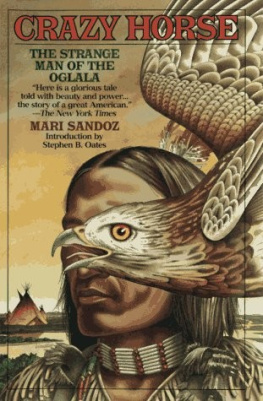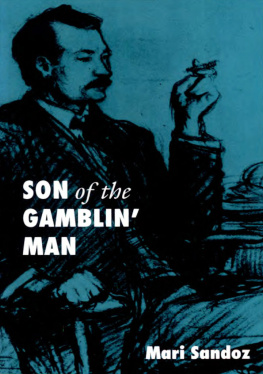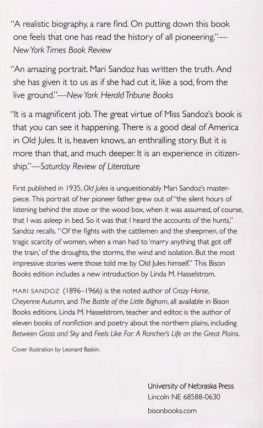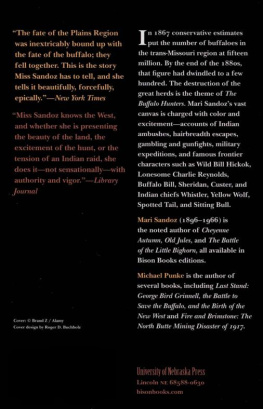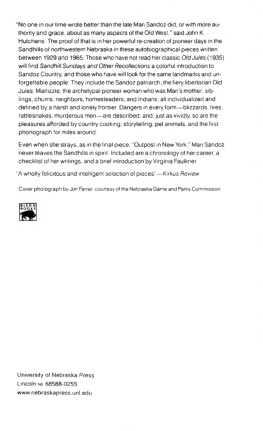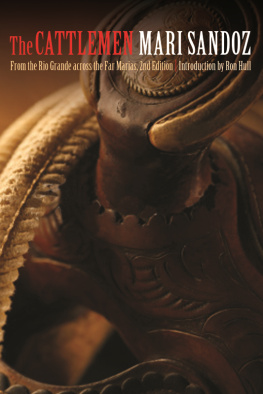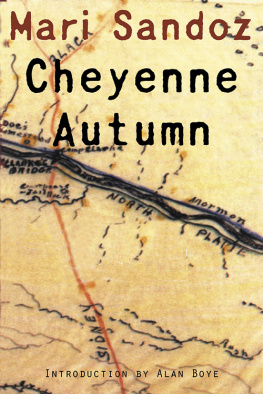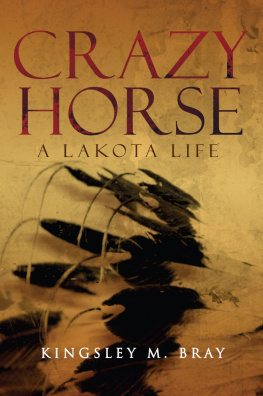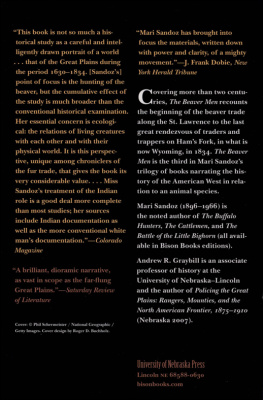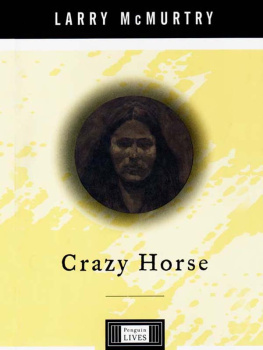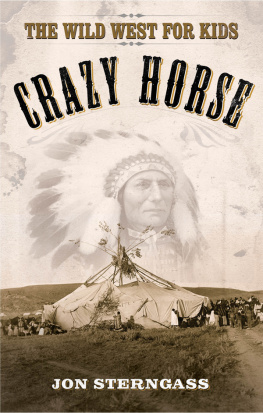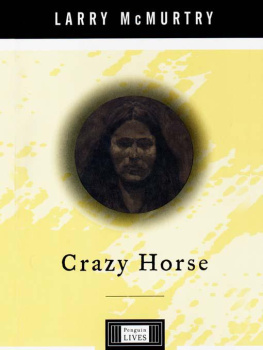Mari Sandoz - Crazy Horse: The Strange Man of the Oglalas
Here you can read online Mari Sandoz - Crazy Horse: The Strange Man of the Oglalas full text of the book (entire story) in english for free. Download pdf and epub, get meaning, cover and reviews about this ebook. year: 1942, genre: Adventure. Description of the work, (preface) as well as reviews are available. Best literature library LitArk.com created for fans of good reading and offers a wide selection of genres:
Romance novel
Science fiction
Adventure
Detective
Science
History
Home and family
Prose
Art
Politics
Computer
Non-fiction
Religion
Business
Children
Humor
Choose a favorite category and find really read worthwhile books. Enjoy immersion in the world of imagination, feel the emotions of the characters or learn something new for yourself, make an fascinating discovery.
- Book:Crazy Horse: The Strange Man of the Oglalas
- Author:
- Genre:
- Year:1942
- Rating:5 / 5
- Favourites:Add to favourites
- Your mark:
- 100
- 1
- 2
- 3
- 4
- 5
Crazy Horse: The Strange Man of the Oglalas: summary, description and annotation
We offer to read an annotation, description, summary or preface (depends on what the author of the book "Crazy Horse: The Strange Man of the Oglalas" wrote himself). If you haven't found the necessary information about the book — write in the comments, we will try to find it.
Crazy Horse: The Strange Man of the Oglalas — read online for free the complete book (whole text) full work
Below is the text of the book, divided by pages. System saving the place of the last page read, allows you to conveniently read the book "Crazy Horse: The Strange Man of the Oglalas" online for free, without having to search again every time where you left off. Put a bookmark, and you can go to the page where you finished reading at any time.
Font size:
Interval:
Bookmark:
Dedicated to Eleanor Hinman, who spent many faithful months on a biography of Crazy Horse and then graciously volunteered to relinquish her prior claim to me.
T HE HOME OF MY CHILDHOOD was on the upper Niobrara River, the Running Water of the old-timers, at the edge of the region they called the Indian Country. It was close, or what seemed close in those open days, to the great Sioux reservations of South Dakota, to Fort Robinson and the Black Hillsthe final places of refuge for many of the old buffalo-hunting Indians, the old traders, trappers, and general frontiersmen who looked with contempt upon the coming of the barbed wire and the walking plow. Such men, with their heroic times all in the past, are often great story-tellers, and these my father, Old Jules, drew to him as a curl of smoke rising above a clump of trees would once have drawn them, or the smell of coffee boiling at sundown.
So, around our kitchen table or perhaps at the evening fires of the Sioux often camped across the road from our house, I heard these old-timers tell many and wonderful stories of hunting the buffalo, the bighorn, and the grizzly, and of Indian fights and raidings all the way from the Arkansas to the Musselshell, from the Missouri to the Green. But most often they talked of the battles in what the whites called the Sioux wars, from that climactic summer day on the Little Big Horn all the way back to the beginning, when, in 1854, the young Grattan with a few soldiers, a drunken interpreter, and two wagon guns foolishly pushed his way into a peaceful Sioux encampment and never came out again.
As I listened to these stories it seemed that through them, like a painted strip of rawhide in a braided rope, ran the name of one who was a boy among the Oglalas the day the chief of his people was shot down. He must have been twelve then, quiet, serious, very light-skinned for an Indian, with hair so soft and pale that he was called Curly or the Light-Haired Boy. But by the end of those wars, twenty-three years later, he was known as the greatest of the fighting Oglalas, and his name, Crazy Horse, was one to frighten the children of the whites crowding into his country, and even the boldest warriors of his Indian enemies, the Snakes and Crows.
And once, while my father was talking to some strangers, Brule Sioux from the Rosebud agency, an old man among them, noticed me sneak up to listen. Reaching out, he took my hand and walked beside me to the top of the ridge above our house. There he shaded his whitish, fading eyes and looked slowly all up and down the river valley and the bluffs and ridges along our side, making a few low Sioux words, annoyed words, his grandson told me, over the white mans way of changing the face of the earth. But after a while he was satisfied. Down there, about where our old Dyehouse cherry tree grew, they had built the death scaffold of Conquering Bear, their peace chief killed by the whites. And later I knew that if this was not the exact spot, it could not have been far from there, and that our gravel-topped Indian hill must be very much like the one to which young Curly fled for fasting and guidance in the confusion of his heart over this shooting by those who called themselves the white brothers of the Indian. Certain it was that the young Oglala had often walked this favorite camping ground of his people, perhaps thrown plums at the pretty girl for whom the great warrior would one day risk everything he knew of this earth.
Yes, truly this was a fine story and evidently many others thought so too, for often I heard of this one or that, sometimes a professional writer, who was working on the life of Crazy Horse. But nothing seemed to come of these ventures, perhaps because there was so little in print about the hostile Indians that held up under investigation and nothing about Crazy Horse that bore much resemblance to the gaudy, blood-thirsty Sioux warrior of popular notion. It is not only that the man was pale-skinned and had little interest in the things that delighted most of his brother Siouxpaint and feathers, singing, dancing, and recounting the honors of warbut that the name by which he was often known. Our Strange Man, seemed to mean just that to many of his followers, and in retrospect, to many descendants of his enemies. I found a strong suggestion of this in the army reports, dated 1876-7, giving the accounts of the spies returning from his camp. Even those sent out from the Missouri River forts felt it, men who had never seen Crazy Horse rally the warriors fleeing from a hard, uneven fight or stand off a Snake charge alone, never watched him walk in silence through his village in peacetime, every face more alive for his passing.
Then came the opportunity to write the story of Crazy Horse myself. I had worked a little in frontier history, been a member of the staff of our State Historical Society some years and associate editor of the Nebraska History Magazine. Now I put in much of two winters in the archives in Washington, going through the AGO Records and the files of the Indian Bureau for the trans-Missouri country from 1840 to 1880; I looked into all the published material on the subject in the historical repositories of Nebraska, Colorado, and Wyoming and the Library of Congress, and all the available documents, letters, and manuscripts, including the interviews of the Ricker Collection at the Nebraska State Historical Society.
In 1930 Eleanor Hinman and I made a three-thousand-mile trip through the Sioux country, locating Indian sites and living out among the people, their wagons stopping at our camp much as they once did at my childhood home on the Running Water. We interviewed the few old buffalo-hunters still alive, including such friends and relatives of Crazy Horse as Red Feather, Little Killer, Short Bull, and particularly He Dog, his lifelong brother-friend. It was well that this was done then, for now He Dog is dead. The last time I saw him was in a thundershower in 1931. It delighted the blind old man to pretend that I had brought the rain. You will come again in the dry time, my granddaughter? he asked. Your step is good for the ears of an old man There have been many dry times since then, but I did not get back before He Dog died.
And now my book of Crazy Horse is done. In it I have tried to tell not only the story of the man but something of the life of his people through that crucial time. To that end I have used the simplest words possible, hoping by idiom and figures and the underlying rhythm pattern to say some of the things of the Indian for which there are no white-man words, suggest something of his innate nature, something of his relationship to the earth and the sky and all that is between. I hope I have not failed too miserably, for they were a great people, these old buffalo-hunting Sioux, and some day their greatness will reach full flowering again in their children as they walk the hard new road of the white man.
M. S.
For assistance with material: Dr. A. E. Sheldon and the Nebraska State Historical Society, of which he is superintendent; the staff of the National Archives, Washington, D. C., particularly those in charge of the War Department and the Indian Bureau records; the Western History Department of the Denver Public Library; the Bibliographical Center for Research; the State Historical Society of Colorado; Lawrence K. Fox of the South Dakota State Historical Society; the Wyoming Historical Department; Dr. Larson of the University of Wyoming for the opportunity to look through the Grace Hebard Collection; the late Helen Blish for visits and notes about her Bad Heart Bull manuscript; and many, many others who are not forgotten.
Font size:
Interval:
Bookmark:
Similar books «Crazy Horse: The Strange Man of the Oglalas»
Look at similar books to Crazy Horse: The Strange Man of the Oglalas. We have selected literature similar in name and meaning in the hope of providing readers with more options to find new, interesting, not yet read works.
Discussion, reviews of the book Crazy Horse: The Strange Man of the Oglalas and just readers' own opinions. Leave your comments, write what you think about the work, its meaning or the main characters. Specify what exactly you liked and what you didn't like, and why you think so.

